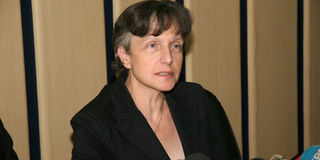Kenya allows Hague free run in poll probe

STEPHEN MUDIARI | NATION. ICC registrar Silvana Arbia at a press conference with ministers at Harambee House in Nairobi, September 3, 2010.
A giant step was taken on Friday on the road to the long-awaited trial of key players in Kenya’s post-election violence, with the signing of an agreement between the government and the International Criminal Court.
The stage is now finally been set for the court to set up base in Kenya as a first step towards punishing those responsible for the 2007-2008 violence in which at least 1,133 were killed.
The agreement signed by the government grants ICC judges, prosecutors, investigators, administrators and other staff the same status enjoyed by foreign diplomats.
It will gives them powers and privileges to move in and out of Kenya, the right to deploy its own armed officers, to import goods duty free and enjoy protection against arrest and prosecution.
By signing the agreement, the government also implicitly gave permission to the ICC to set up a court in the country to try post election violence suspects if it wanted. The signing followed a visit to Kenya by the court Registrar, Ms Silvana Arbia, who is scheduled to leave the country on Saturday.
Earlier there had been concern that the agreement might not be signed after an initial meeting at the Office of the President on Wednesday ended without an agreement, and with the ICC team staying away from a news conference addressed by Internal Security minister George Saitoti.
The signing of the articles also showed the government’s commitment to take the ICC process seriously and binds it to cooperate fully with the body until it completes its work.
On Friday, Kenya National Commission on Human Rights official Hassan Omar said it would now be difficult for the government to refuse to hand over key suspects of the violence to the ICC if summoned after allowing it to operate locally. “More witnesses would also now be able to give evidence while Kenyans will be able to track the progress of the investigations,” Mr Omar told the Saturday Nation.
ICC registrar Silvana Arbia, whose office serves both the prosecutor’s and the defence, was happy with the government’s move to accept the ICC request saying she trusts the State would fully respect its obligations under the Rome Statute and facilitate the court’s process. “With the exchange of letters (agreement), the operation of our legal framework in Kenya is in place,” Ms Arbia said.
The agreement signed by Foreign Affairs Minister Moses Wetang’ula on behalf of the government allows the ICC to establish its premises in Kenya and that its property and assets including archives and documents shall be inviolable and immune from any legal process.
The 2007-8 post-election violence followed disputed presidential election results and left more than 1,133 people dead and more than 600,000 uprooted from their homes. President Kibaki was declared the winner of the polls as ODM leader Raila Odinga cried foul. After mediation talks chaired by former UN chief Kofi Annan, the two rival parties, PNU and ODM, agreed to the formation of a grand coalition government that ended the violence.
Investigations into the cause of the violence headed by Mr Justice Philip Waki resulted in a list of key perpetrators being handed over to the International Criminal Court. The list of the suspects has not been made public, but it is said to include several ministers and MPs.
Kenya had promised to deal with the suspected leaders of the clashes, but attempts to start the process through formation of local tribunal failed and many Kenyans were sceptical that those responsible would be arrested and charged. Mr Annan has warned that unless those most responsible for the chaos were brought to book, there was a risk violence would return at the next election in 2012.
Last year, ICC chief prosecutor Moreno-Ocampo set in motion the wheels of justice to try the perpetrators after President Kibaki and Mr Odinga agreed to facilitate arrests of the indicted, irrespective of their positions.
On Thursday this week, Ms Arbia said investigations by the chief prosecutor were still in the initial stages, adding that the Pre-Trial Chamber II would only issue warrants once it was satisfied with the evidence collected by the prosecutor. She pointed out that the lack of an arrest mechanism was one of the challenges facing the court. Mr Omar termed the government and ICC’s move as “extremely positive” and would boost Kenyans’ confidence that perpetrators of the post election violence would be punished.
On Thursday, the ICC revealed that 396 victims of 2007 post-election violence have formally given information to it. It also revealed that it is protecting unspecified number of witnesses. Not all witnesses will however testify against the perpetrators of the chaos, Ms Arbia, said. Ms Arbia arrived in the country early this week to prepare the ground for the setting up of the local operations of the court.




